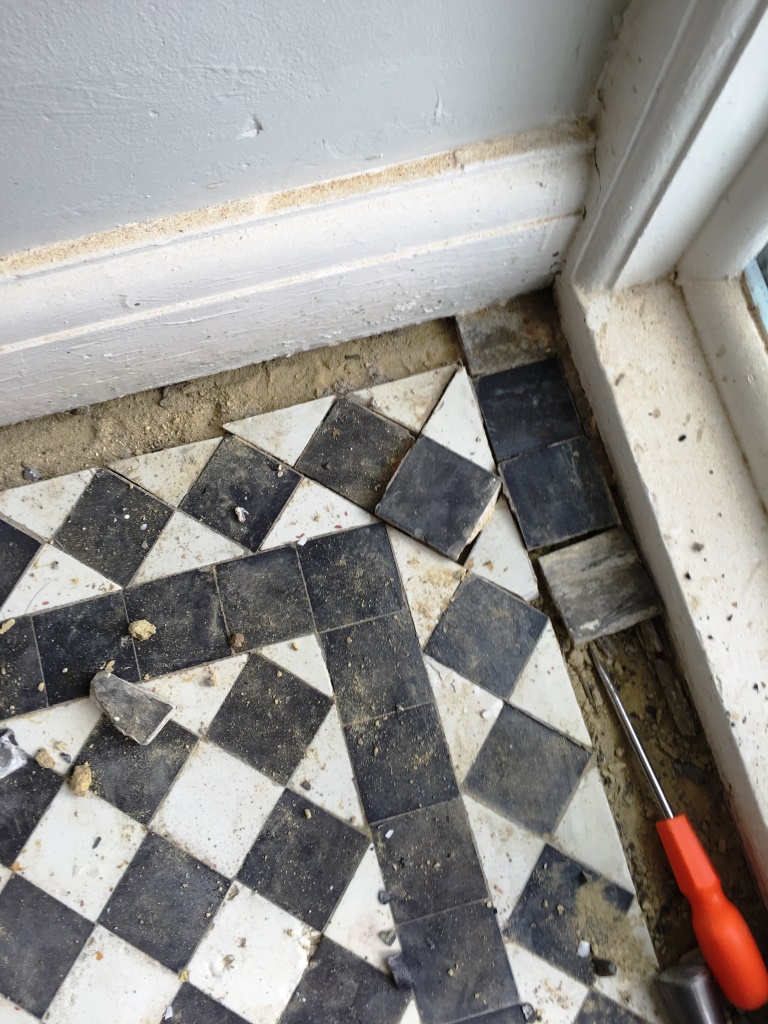I was recently called to a property in the historic city of Oxford, perhaps most famous for being the site of the oldest University in the English-speaking world. The property owner asked me to take a look at a linoleum floor, which was partially revealing a black and white patterned, Victorian tiled floor underneath, to see what I could do with it. Although it would be a challenging and lengthy job, I assured my client that I would be able to restore the hidden Victorian tiled floor to its original condition.
 |
 |
Removing the linoleum covering and cleaning the floor
My first task was to carefully scrape off as much of the linoleum covering as possible without damaging the floor beneath.

Once the linoleum had been removed, my next step was an initial clean of the floor.
Firstly, I applied a layer of Tile Doctor Remove and Go, which would help to draw out the ingrained dirt and stains. I left the product to dwell for only a short time as I did not want it to dry on the surface of the floor. Following this, I scrubbed the floor with a medium brush attached to a Rocky floor cleaning machine, before rinsing the area with clean water and then repeating the process again.

To take the cleaning process a step further, I mixed a solution of Tile Doctor Pro-Clean and NanoTech HBU, which uses nano-sized particles to penetrate below particularly tough stains and lift them out. This solution was applied to the floor and left to dwell for roughly two hours. I then used my floor machine (which weighs 57kg when full) with a medium brush and scrubbed the surface once again. After completing the cleaning process, I made sure to rinse the floor multiple times in order to ensure all the products had been rinsed away.

Floor repair, tile replacement and sealing
I then set about digging out the concrete lines that were in the floor; these were likely the reason for having the floor covered in linoleum in the first place. One area under the concrete lines contained a gas pipe, which I found to be obsolete, and another contained an electrical wire, which I had to test in order to ensure it too was no longer functioning. I dug out the concrete, and removed all the tiles around the edge of the room, where carpet grippers had been put down, effectively smashing nails into the floor.

Once I had sourced a total of 268 replacement tiles, I set about careful laying them down in a pattern that was consistent with the floor’s original appearance, once the tile adhesive was dry they were then grouted and the floor was then left for a week so they could set properly.
 |
 |
When I returned after this period, I mixed a solution of Tile Doctor Pro-Clean and water, and applied it to the floor. I left it to dwell for about 30 minutes, periodically stubbing with a deck brush. I then once again utilised my floor cleaning machine with a medium brush to scrub the floor, rinsed the area with more clean water, and then vacuumed up the excess liquid. The floor was let again to dry, this time for a period of a few days.

When I returned to the property after a few days, I used a damp meter to test the floor, making sure that the surface was dry enough to commence sealing (as any excess solution might have affected the performance of the sealer). My sealer of choice was Tile Doctor Seal & Go, a topical sealer which provides a sheen finish (as requested by my client) along with durable protection.

Overall, the job took more than three weeks to complete, but it was extremely satisfying to see the restored Victorian tiled floor, back to looking great again. My client was also very satisfied with my work, saying:
“We are delighted with the work Barry carried out for us. He had restored our floors with care and attention to detail, and we are really pleased with the final result!”

Source: Professional Tile, Stone and Grout Restoration service in Oxfordshire
Tile Doctor have the products and training to handle a multitude of issues surrounding hard flooring.